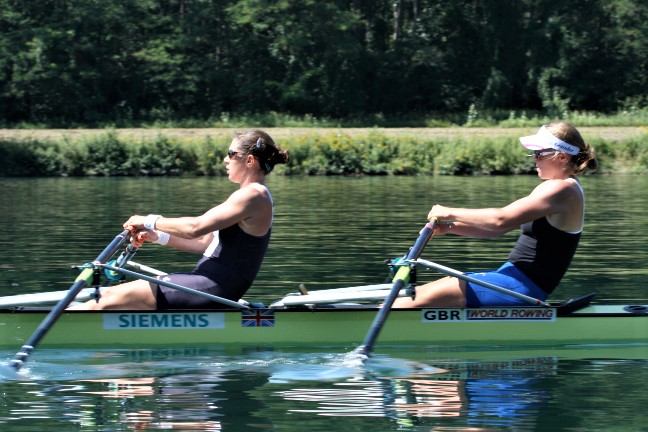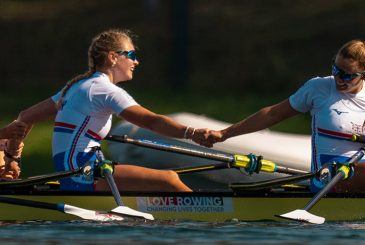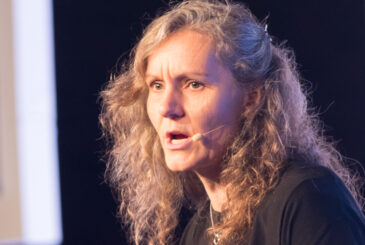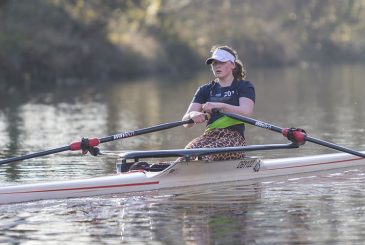Olympic silver medallist Annie Vernon shares her personal insights on how you can transform your team from good to great. Author of Mind Games, Annie’s book was a winner in the recent 2020 Telegraph Sports Book Awards
Rowing is a sport emphatically based on teamwork. Unlike other team sports where a star player can turn a match, rowing crews rely on developing perfect synchronicity. Despite being the most important part, teamwork is also the most difficult part to get right. Sports teams are somewhere between siblings, spouses, competitors, friends and frenemies.
How do you get everyone on the same page? Does the crew need to be friends? And – much like a marriage – do opposites attract, or is it better to be similar personalities?
Building the magic – the context

Olympic silver medallist at Rio, Jess Eddie says: “When a rowing boat is going well, it sounds silly, but you think you’re flying. It’s easy; your body is in perfect unison with your mind and with your teammates. Yes, it’s physically hard, but it’s incredible. Especially, in an eight – getting nine women to do the same thing at the same time on the same page is so hard, so when it does work, it’s a bit magical.”
We can’t jump into a boat and immediately experience the outcome described by Jess. It takes hours of training and disagreements before things start to come together.
So, how do we build a team?
The first step is acknowledging that the crew is only as good as its weakest member. I learned this early on when I realised that I was only focusing on my own performances and wasn’t thinking about anyone else’s.
Jess had a similar lightbulb moment, revealing: “For a while, I was going through the system and just thinking about me, and making myself the best I could be, and getting my head down – and thinking I’m going fast, why aren’t we all going fast?
“But then my coach pulled me aside and said, ‘You can do all this, you can do the training programme; I could set you more stuff and you’d still do it. But you need to start taking everyone else with you. Don’t be an island’. Then I had to put my pigheadedness and competitiveness aside.”
Great teamwork is about understanding that everybody brings something different to the crew. I never felt I had to have all the answers on my own because I was surrounded by a diverse group of people with different backgrounds, identities, approaches, strengths and weaknesses, who all bring their little bit to the party.
When you can actually construct teams to be really, truly truly happy, it just produces an electricity that is almost unfathomable
Olympic silver medallist and former world champion Cath Bishop agrees, saying: “I’d have thought if you had two similar people, you’d clash a lot, and you would want to complement each other.
“[One former rowing partner] was always very relaxed, and I’d be always going, ‘No, we need to do it again, that’s not good enough’. Whereas, if you had two people going, ‘No that’s not good enough’, you’d never finish the session!
“In my mind, it’s more normal to have that blend of relaxed and negative people in a boat.”
Olympic and former world champion Anna Watkins also agrees. Having lots of different personalities is a strength, as long as the team explicitly makes it a strength.
Relating this to when we rowed together in the double sculls, Anna says: “As I got more experienced, the common thread between all my different teammates was the realisation that bringing the best of myself to the boat was only part of it, and it was also about how you, and [other crewmates], needed to be in the boat.
“So, for you and me, I understood that it was helpful for you if we had a laugh, but also that there were certain points where I was in charge, and assertive; and that made you feel like you didn’t have everything on your shoulders in the stroke seat. I sensed that you performed better if I was clear and decisive.
“And for [other rowing partners], they were both very different again and needed different things from me.”
Do you need to be friends with your teammates?
Role clarity isn’t just about who sits at stroke, or who has the steering foot. It’s about informal roles: how we relate to each other as people. Some of us need to have a joke, some are fond of spreadsheets, some like firm instructions.
How did Anna learn to read her teammates?
“I don’t know if it’s emotional intelligence, or just being stuck together 24/7 for years!” she says.
“You are going to see them at their best and their worst, and you’re going to have a pretty good idea about their whole self – which I think is a pretty awesome thing about team sports.”
Can rowers learn from footballers?
Though we’ve only heard from female rowers, this applies equally to men.
Another key question is, do you need to be friends with your teammates? Initially, I would have said no. I’d have argued that as long as you can work together, you don’t need to be friends. Over time I changed my mind. Being friends can help you develop better resilience.
One psychologist who has a unique take on friendship is Ken Way, psychologist to Leicester City FC during their Premier League-winning season of 2016. He believes passionately in the need to be happy.
Can rowers learn from footballers?
He says: “The team spirit was fantastic, and for me it was epitomised by one of the players, an Austrian international called Christian Fuchs, who said we were just friends having fun on the football pitch. And that for me really encompassed exactly what was going on.
“The guys were just enjoying themselves – they were having fun.
“When you can actually construct teams to be really, truly truly – and I can’t get this across strongly enough – happy and having fun being together, it just produces an electricity that is almost unfathomable.”
Jess told us that great teamwork is magical, and Ken describes an electricity that is possible. There’s something special and intangible here in our sport of rowing.
Teamwork – the personality mix

Teams aren’t just relevant to sport. They exist in every part of life and are critical in the workplace.
But I want to know what Mother Nature intended. Are we predisposed to teamwork, or are we wired to be better off on our own?
Anthropologists have compared our behaviour with primates and have concluded that one of the key reasons for our success, in evolutionary terms, is the fact that we are team players. We can, and do cooperate, and share the spoils.
Could we therefore argue that single scullers are fighting against evolution?
One research paper observes: “Humans’ ability to collaborate to obtain otherwise inaccessible goals may be one main cause for our success as a species.”
And in addition, we as humans are prepared to enforce teamwork, and exclude those who don’t collaborate effectively. Another research paper concludes: “Humans, in contrast to all other species, employ a wider range of enforcement mechanisms, which allows higher levels of cooperation to evolve and stabilise among unrelated individuals and in large groups.”
Could we therefore argue that single scullers are fighting against evolution?
From anthropology to personality profiling: the tool that Anna and I used to explore our personalities and so approach to teamwork – more of this later – was the Myers-Briggs Type Indicator (MBTI). Developed by Isabel Briggs Myers and her mother Katharine Briggs in 1942, it is based on the theories of psychiatrist Carl Jung and is one of the most widely used personality profiling tools across sport and business.
Katharine Briggs embarked on her work after meeting her future son-in-law and considering him to have a different personality from the rest of the family. We should reflect on that the next time our mother says she doesn’t like our new partner.
Fortunately, my mum has never felt the need to develop a new psychological tool that influences corporations and governments, on the basis of a potential Mr Vernon that she wasn’t keen on.
Jung’s theory describes how humans use four principal functions – sensation, intuition, feeling, and thinking – to experience the world. Myers-Briggs assesses people according to those four markers, selecting individuals into one of 16 categories based on a matrix of the four pairs of preferences.
Emotional intelligence and communication is what separates the good from the great
The four pairs are as follows: Your attitude is described by introversion/extraversion (based on whether you seek people or withdraw into yourself under pressure); then two sets of functions relating to the outside world: gathering information through sensing/intuition and making decisions based on thinking/feeling.
Sensing is about relying on the five senses and the here and now; intuition refers to looking at the big picture and the future. Thinkers will analyse information then make a judgement, whereas feelers make decisions through empathy.
Finally, how you relate to the outside world is judging/perceiving. People in the judging category like structure; perceivers may put off making decisions and are happy to be flexible.
How you sit within these four pairs will give you an acronym – for example ISTJ (Introvert/ Sensing/Thinking/Judging). Like a recipe, these four characteristics are blended together to describe your personality as a whole.
Critics have said it has poor reliability; and it may be imperfect, but MBTI is the most popular method used worldwide.
Anna and I found that personality profiling is a way of understanding why conflict or harmony exists in teams. Effective teamwork isn’t just about making technical changes in order to row together: that’s the easy bit. Emotional intelligence and communication is what separates the good from the great, and personality profiling quantifies and offers explanations as to what’s going on.
Personal insight – resolving teamwork issues

I’m going to tell a tale of two double sculls. I had the fortune to row in a double with Anna Watkins twice in my career. Once in the 2006 World Rowing Championships, when we were both wet behind the ears; then again in the 2009 World Rowing Championships, wiser and battle-hardened, when we’d both returned from the 2008 Olympics with medals. She, a bronze in the double; me, a silver in the quad.
The two doubles were chalk and cheese. The first time was terrible, the second fantastic. Same people, same boat, two very different experiences.
In 2006, we approached our rowing from fundamentally different places. Both of us were convinced that we were ‘right’ and the other was ‘wrong’. There were too many differences.
Doing personality-profiling was one of the biggest performance steps we’d made all season
Anna enjoyed pushing our top-end performance and the big picture; I wanted every detail to be perfect. Anna liked to discuss our training and performance with other members of the team – I preferred to keep things in-house. I liked to complete every final kilometre of the training programme, whereas Anna was happy to focus on the most important parts.
Late in that season it was recommended by Dr Chris Shambrook, our sports psychologist, that we do a personality profiling exercise. Myers-Briggs was suggested.
Doing this exercise was one of the biggest performance steps we’d made all season. It enabled us to quantify what was going on: that it wasn’t that one was right and one was wrong, but that we were different. We viewed the world through different eyes and had contrasting priorities and approaches.
It revolutionised our approach to teamwork, but we did the exercise too late to make an impact at the World Rowing Championships.
What happened? We went slower than we were capable of and finished the season with a fourth place at the Worlds and a head full of regrets.
The second time around, we explicitly targeted the mistakes we’d made three years previously. We made sure our strengths complemented the other’s weaknesses, and we prioritised our communication. We worked hard to find common ground, and built on that; plus, rather than fighting over who was ‘right’ and who was ‘wrong’, we accepted that we each brought contrasting approaches to the boat.
We became world silver medallists behind a strong Polish double at the 2009 World Rowing Championships in Poznan.
Anna and I remain close friends and still talk about how far we punched below our weight in 2006. And it’s worth pointing out that in 2006 we hadn’t long graduated – and were still carrying the consequences of the university beer and kebab diet – so there was a lot of weight to punch below.
Annie’s tips for great teamwork
- The quality of your communication will determine the speed of your boat.
- Understand your teammates’ motivations and approaches.
- It is important to be friends. Take time to build relationships off the water.
- Learn from each other: everyone has a different perspective.
- Play around with the seating order. You might be surprised by what clicks.
Annie’s book, Mind Games: Determination, doubt and lucky socks, is available in paperback from Bloomsbury Publishing.
Photos: Naomi Baker, Drew Smith, Annie Vernon










